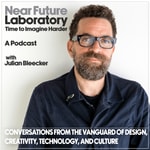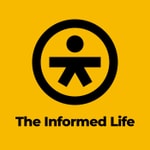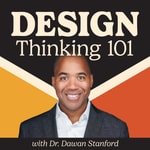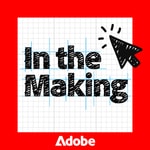Near Future Laboratory Podcast – Details, episodes & analysis
Podcast details
Technical and general information from the podcast's RSS feed.

Near Future Laboratory Podcast
Julian Bleecker
Frequency: 1 episode/14d. Total Eps: 103

Recent rankings
Latest chart positions across Apple Podcasts and Spotify rankings.
Apple Podcasts
🇫🇷 France - technology
14/01/2025#73🇫🇷 France - technology
13/01/2025#90🇫🇷 France - technology
13/10/2024#100
Spotify
No recent rankings available
Shared links between episodes and podcasts
Links found in episode descriptions and other podcasts that share them.
See all- https://www.thejaymo.net/
298 shares
- https://www.polaine.com/
40 shares
RSS feed quality and score
Technical evaluation of the podcast's RSS feed quality and structure.
See allScore global : 38%
Publication history
Monthly episode publishing history over the past years.
N°092 - The Future of Work Is Not ‘Work from Home’
Episode 92
mardi 24 septembre 2024 • Duration 08:50
Read More 👉🏽 https://detroit.imaginesharder.com
Can you imagine your idea of the future of work, beyond Zoom calls from the beach?
What is the Onboarding Guide for the Future of Work?
What is the Resumé from the Future of Work?
What does the equivalent of the ‘org chart’ look like?
Want to help create a reinvigorated future imaginary of what work could be? Want to try your hand at Design Fiction Worldbuilding?
Join me for Detroit Imagines Harder: Futures of Work, a 3-day Design Fiction Summit & Workshop held in real life in real Detroit.
Just a few spots left!
October 16-18, 2024.
Read More 👉🏽 https://detroit.imaginesharder.com
N°091 - Imagine As Hard As Philip K. Dick with Tobias Revell
Season 1 · Episode 91
vendredi 26 juillet 2024 • Duration 31:56
Tobias and I have a tidy morning/evening conversation that revolves around the impact of Philip K. Dick's science fiction, particularly how his imaginative devices influence modern technological narratives. We talk about the ways he refers to and anticipates AI and other artifacts, of course there's a deep dive into the significance of the Minority Report's gestural interface created for the 2001 film adaptation, and how it has influenced real-world technological advancements.
What prompted this discussion was the recent release of the book Towards the Realm of Materiality: Designing Philip K. Dick's Non-Existing Technologies and Androids Dream of Electric Sheep, the PKD book from an "adjacent now."
The question I have is this: what methods can be adopted in order to operationalize these science fiction themes into practical realities, with the aim of constructing a more habitable world using advanced design and speculative concepts.
Please consider supporting the podcast and joining the Near Future Laboratory community over on Patreon!
Exploring AI Imaginaries and Future Speculations In this episode, we discuss the continuation of the AI magazine project and the upcoming season of the Super Seminar series. And then we jump into discussing the book in which Tobias has an essay about the philosophy and conceptualization of technology in Philip K. Dick's works, particularly focusing on the adaptive nature of everyday technology. We get into the production design and cultural impact of the 2001 film "Minority Report", based on the 1956 (!) PKD novella of the same name, emphasizing how media can shape and influence technological advancements. 00:00 Introduction and Recap 01:53 Discussion on AI and Philip K. Dick 05:17 Minority Report and Technological Vernacular 11:25 Speculative Design and Future Technologies 16:44 Cultural Impact and Future Visions 25:03 Breeze Punk and Green Transition
Last Week from the Near Future N°009 - Weeks 51-52/2023
vendredi 12 janvier 2024 • Duration 09:06
Some things that happened at the Near Future Laboratory the last weeks of 2023 including a day trip to SFO using a travel voucher that was going to expire at the end of the year, meeting with the NFL gang for an awesome lunch and chat, hanging with Will Carey from https://formation.eco to continue working on the meaning, purpose, and offering of this reinvigorated evolution of Near Future Laboratory. There were also a bunch of (other people's) podcasts that dropped (links below). And it was the 9 year anniversary of OMATA which had me go back and reflect on how I used Design Fiction to help me create a future vision of the company and share that vision with investors who were so enthralled with this vision that they ended up buying the whole company. Links https://formation.eco https://medium.com/design-fictions/why-did-i-write-an-annual-report-from-the-future-849cf12b0687 Reality Plus https://podcasts.apple.com/us/podcast/realitypl-us/id1722133066?i=1000639248112 https://youtu.be/ld6FLoCH3Vw?si=NYJEXdD3jLDIybdg Expedition Works' Journey with Purpose https://podcasts.apple.com/us/podcast/julian-bleecker-a-little-bit-more-curious/id1697389263?i=1000638677720 In Clear Focus / Design Fiction https://bigeyeagency.com/design-fiction-with-julian-bleecker/
N°01 - Fabien Girardin and Nicolas Nova
Season 1 · Episode 1
vendredi 25 décembre 2020 • Duration 01:31:45
N°082 - Shashwath Santosh and The Innovation Crisis
Episode 82
dimanche 24 décembre 2023 • Duration 37:41
Episode 082 of the Near Future Laboratory Podcast with Julian Bleecker in conversation with Shashwatch Santosh.
Please support this work and join the Near Future Laboratory Discord through Patreon:
https://patreon.com/nearfuturelaboratory
You can also support the work by buying something from the Near Future Laboratory Shop of Futures Artifacts:
https://shop.nearfuturelaboratory.com
In Episode 082, Shash and I dance around the world of design education from Shash’s experiences at Parsons School of Design. He describes the challenging norms and his explorations around the boundaries of speculative design and Design Fiction. Shash reveals that he is a proponent of creative confusion, and shares his journey through design school, emphasizing the importance of breaking away from traditional labels and constraints. We get a candid discussion of the struggle to define his work, moving beyond conventional roles like industrial designer or object maker, and embracing the ambiguous realm of speculative design.
Shashwatch's insights are insightful and profound, particularly useful for those in or considering design education. I was especially intrigued by his critique of how the term 'speculative design' can inadvertently create aesthetic stereotypes and limit the scope of design projects. He advocates for a design approach that transcends labels, allowing work to speak for itself without being confined by preconceived notions of discipline. This approach, he believes, fosters creativity and opens up a world of possibilities beyond the conventional boundaries of design.
I somewhat echo Shashwatch’s sentiments, and we wonder together and probe the practical aspects of translating expansive and imaginative thinking into viable career paths — where viable means an exchange of value (insight/imagination/creativity for $$$). Shashwatch responds with examples from his own life, discussing the challenges of job hunting and the importance of presenting work effectively to various audiences. He highlights the significance of maintaining technical rigor in projects, which helps in navigating the murky waters of creative industries.
Shashwatch also shares his experience of struggling with familial expectations and the pressures of justifying his unconventional career path. He stresses the importance of finding a balance between creative freedom and economic viability, a dilemma faced by many in creative fields. His journey underscores the need for designers to possess not just creative skills but also the ability to articulate and market their ideas effectively in a commercial context.
You can find Shash’s thesis project 'The Public Library of Usables', a concept born from his exploration of object-oriented ontology. This project challenges traditional object functions, inviting a re-imagination of how objects are used and interact with each other, reflecting his deep engagement with speculative design principles.
Hopefully this Episode provides a compelling narrative on the complexities of design education and practice, highlighting the importance of breaking conventions, embracing ambiguity, and balancing creative aspirations with practical realities. I’d say that Shash's journey and optimism is a testament to the transformative power of speculative design and the value of creative exploration in shaping a unique design identity.
Last Week from the Near Future N°008 - Week 50/2023
dimanche 24 décembre 2023 • Duration 07:10
1. Postcards from some possible futures, sent to me by Elliot P. Montgomery 2. A Magazine from the Future in which autonomous vehicles are about as normal, ordinary, and everyday as television remote controls, wheels on luggage, and laptop sleeves. 3. Androids Dream of Electric Sheep, our pulp pop-psychology paperback from some future in which Sony's Aibo became as popular as the Sony Walkman and now, well — they're just here, and about as ferocious as a cuddly cute robot dog. https://magazinefromthefuture.comhttps://shop.nearfuturelaboratory.com... * Exploration of Possible Futures through Artifacts: The use of creative artifacts like postcards, magazines, and books to explore and represent possible futures. These artifacts are designed to augment traditional, analytical approaches to future studies with imagination and sensory experiences. * Design Fiction as a Tool: The value of design fiction is that it’s a method that translates ideas and scenarios about the future into tangible, visual forms. You can think of Design Fiction’s translation of research analysis into something engaging as an analog to the way a screenplay becomes an immersive, engaging visual story when it is made into a film. Design fiction serves to make future concepts more relatable and understandable. * Some Examples of Artifacts I've Created * Magazine from a Future with Autonomous Vehicles: Created for a client, this magazine represents a world where autonomous vehicles are commonplace. It was developed through workshops with various researchers and designers, capturing collective hopes, fears, and expectations. * Book from a Future with Ho-Hum Androids: Imagine a world where androids are as common and non-threatening as a Sony Walkman. I created a book from that world — a pop-psychology analysis of the Android psyche. * Imagination and Speculation: It’s important to imagine and speculate about different futures, considering the wide-ranging implications of technological advancements. Design Fiction presents the useful challenge to think beyond the immediate and apparent effects of new technologies. * Cognitive and Sensory Engagement: Design Fiction is a way to create more immersive and sensory engagement with future scenarios, moving beyond traditional, data-driven methods. Design Fiction emphasizes the role of imagination and creativity - the making of artifacts from these futures — in making future studies more accessible and emotionally resonant.
N°081 - Randy Plemel is Expedition Works
Season 1 · Episode 81
samedi 16 décembre 2023 • Duration 40:00
Randy Plemel is a design and innovation consultant specializing in solving hard and complex problems for people in elegant, and hopefully simpler ways.
Randy has worked with a wide range of organizations in the public sector on democracy promotion, and the private sector on who their customer might be, including the Knight Foundation to reimagine the civic commons across eight cities, Bloomberg Philanthropies to cultivate city-based innovation in the U.S. and India, AARP to evolve their role in creating livable communities for all, and the City of Los Angeles and NYCHA to make cities better through design.
He’s also completed a range of new products and services with a diverse set of clients—including State Farm, Steelcase, the Consumer Financial Protection Bureau, Tata, Citibank, Dr. Reddy's Laboratories, and Walgreens—on a variety of design challenges, from new digital communication tools, to blended digital and physical experiences, to entirely new retail strategy and concepts.
Randy holds a BS in Architecture and Masters of Architecture from the University of Cincinnati.
https://www.linkedin.com/in/randyplemel/
Expedition Works: https://expedition.works/
Journey With Purpose: https://jwp.news/founding/
Avery’s Journey, Randy’s Design Fiction exercise gives purpose to Generative AI tools rather than freaking out or fetishizing and drooling all over them.
https://expedition.works/project/averys-journey
Journey With Purpose Podcast https://podcasts.apple.com/us/podcast/journey-with-purpose/id1697389263
(p.s. This ‘Better Bin’ episode with Colin Kelly discussing how his ad-hoc, let’s-see-what-happens submission to get the contract to design the new New York City public trash bin is awesomely inspiring.
https://podcasts.apple.com/us/podcast/colin-kelly-better-bin/id1697389263?i=1000633101486)
Last Week from the Near Future N°007 - Week 49/2023
mercredi 13 décembre 2023 • Duration 07:34
Here it is. Another episode of 'Last Week from the Near Future'. This is Episode 007, for Week 49 of 2023.
Please support the Near Future Laboratory Podcast and get access to our awesomely vibrant Near Future Laboratory Discord community over on Patreon. Here's what I covered. PDPal: A 20-Year Anniversary I'm taking you on a trip down memory lane as I reminisce about the PDPal project, an emotional GPS I worked on 20 years ago. Discover how it made its way to the Times Square Jumbotron and how this early exploration of technology was an art-led prototyping of the kinds of location-based experiences we now take for granted from mobile devices. What most resonates for me about this project, on reflection, is the critical role of imagination and imaginative art projects in driving innovation. And it occurred to me that this was as good a time as any to reflect on the two major mobile projects I've done in my career, that being PDPal and the OMATA App. Both were done on a bit of a shoestring and with fairly high personal stakes, and both are, I would say and have been told, beautiful and evocative instances of design and engineering. Archigram and Speculative Architecture Archigram! The renowned collective of architects known for their imaginative designs in the 1960s. Consider their speculative architectural practice in contrast to today's world of Generative AI + Architecture, a topic I invite you to join me to discuss in Super Seminar 005 (https://superseminar.school) Patreon and Near Future Laboratory I'm excited to announce our new Patreon, where you can join me and many others in the Near Future Laboratory Discord, along with our weekly office hours. We've had an incredible 190 sessions so far – that's 190 Friday's in a row, as of last week! (https://patreon.com/nearfuturelaboratory) Chris's Employee Handbook Project Chris Butler is the showrunner for this project in the Discord: creating an employee handbook as a Design Fiction archetype in order to explore possible futures of organizations. Book Haul Check out 'The Stray Shopping Carts of Eastern North America' by Julian Montague. This book cleverly treats shopping carts as natural phenomena within our world of stuff – it's a fascinating read. Very kinda Design Fiction-y. Magazine from the Future of AI Project I'm introducing a draft proposal for the 'AI Future Magazine' project. Our goal is to make the AI future more tangible and relatable. If you want to get involved and help create a magazine set in a future where AI is an everyday part of life, join us through Patreon!
Last Week from the Near Future N°006 - Week 48/2023
mercredi 13 décembre 2023 • Duration 09:58
Here it is. Another episode of 'Last Week from the Near Future'.
Last Week from the Near Future Laboratory - Week 48/2023 This is what I was thinking about. 1. Failure of Imagination: This concept is a common issue in organizations that struggle to envision anything beyond their current operations. Design Fiction can help with imagining and visualizing potential unexpected events and futures or even those that no one is able to grapple with or say out loud for fear of becoming a pariah. Design Fiction does this uniquely, behaving in a way like a court jester in some sense and thus help to avoid this pitfall. 2. AI Futures in Everyday Life: It is important that we imagine AI's impact on ordinary, everyday aspects of life, such as breakfast routines or sports, rather than just focusing on extreme dystopian or utopian scenarios. 3. Material Cultural Artifacts: Creating tangible representations of potential futures, like magazines from an imagined future, not only yield better, richer, more compelling and engaging visualizations of possible futures, the work required to create them is actual design work. Making to think and making to engage in conversations yields a richer way of 'ideating' and yields a deeper appreciation of possible outcomes. 4. Design Fiction: A brief description of the concept of Design Fiction as a tool to bring research to life, transforming dry, prose-based research into tangible, vivid, and relatable artifacts. 5. Importance of Vivid Representations: I try to underscore the value of creating vibrant, imaginative representations of the future, such as illustrations or fictional artifacts, to make future scenarios more relatable and understandable. 6. Near Future Laboratory’s Approach: We here at Near Future Laboratory uses Design Fiction to create artifacts and representations that help people envision and understand potential futures. 7. Future Seminar and Community Platform: We've got SuperSeminar (https://superseminar.school) coming up on Generative AI. 8. Discord: The Near Future Laboratory has a Discord community, now about 3 years old and with over 1000 members. To join, go to https://patreon.com/nearfuturelaboratory
MINISODE: SuperSeminar 005 Sneak Peek with Hassan Ragab
samedi 2 décembre 2023 • Duration 09:40
SuperSeminar 005 is our second session on Speculative Architecture and Generative AI. Here's a sneak peek with Hassan Ragab where we get some insights into how GenAI is shaping what architecture is becoming. Do you want to know more? Sign up for SuperSeminar 005 at https://www.superseminar.school/ss005/genai-architecture our platform for learning from the key individuals who are at the vanguard of the transformational potential of new practices, tools, mindsets and approaches. Save 50% on all 3 of our upcoming Generative AI sessions! https://ti.to/near-future-laboratory/super-seminar-004/with/super-seminar-bundle-max









